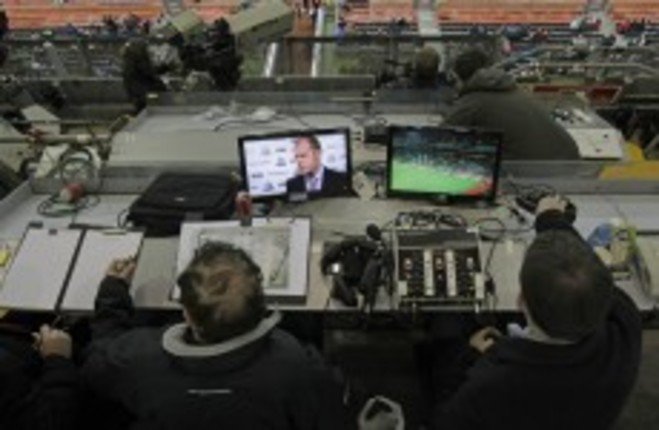1. “BRRRIIIIING! It’s a journalistic axiom that when your phone rings early on a Monday, from a blocked number, it’s generally not because somebody loves your work. I picked up to hear an angry Lance Armstrong on the line, along with Doug Ulman, the CEO of the Lance Armstrong Foundation—a.k.a.Livestrong. It was 8 a.m. in Austin. They were calling to berate me about what they considered my bias against Livestrong and Lance. Which seemed strange, since I wasn’t working on a Livestrong article. Not yet, anyway.”
Writing for Outside magazine, Bill Gifford takes a close look at Lance Armstrong’s Livestrong foundation and starts asking questions.
2. “There were a lot of tears in Libreville on Sunday. There were the tears of Pierre-Emerick Aubameyang, overwhelmed by having missed the decisive penalty in Gabon’s shootout defeat to Mali and there were the tears of Seydou Keita as he used his side’s progress to the semi-final for the first time in 10 years to highlight the crisis overwhelming his country. Keita began the tournament fronting an Oxfam campaign to raise awareness of the food crisis sweeping the Sahel after a year of poor rains. His words on Sunday were even more emotive, and came with a ringing immediacy. His face as he stepped up to take the final penalty looked drained, but his nerve remained sure and he converted with a precise, low shot.”The Africa Cup of Nations comes to a close today but, off the pitch, the best thing about the tournament has been Jonathan Wilson’s series of articles in The Guardian. Here’s one of the best, written on Tuesday when war-torn Mali qualified for the semi-finals.
3. “On Thursday, Nov. 15, 1906, operatives of the Central Union Telephone Company began stringing wire around Mahaffey Park in Canton, Ohio, preparing a little trial in turn-of-the-century technology. The idea was, a Central Union agent would stride up and down the stadium’s sideline the next day, telegraphing accounts of the action between the Canton Bulldogs and the Massillon Tigers to newspaper offices throughout the country. This experiment took into account two national preoccupations: the fascination with anything modern—especially electrical—and professional football. This would be the first of two games (with a third if required) to decide the championship of the world.”
A lot of Ireland seemed to get sucked into Super Bowl mania last Sunday night. In Sports Illustrated, Richard Hoffer writes about one of the modern game’s predecessors — a battle for football supremacy between two Ohio teams. Brilliant.
4. “Harry Redknapp does not have a soul, but he has a sort of dead-eyed Cockney sparkle that’s served him as a pretty adequate replacement. England’s most successful English soccer manager, he’s also England’s most successful allegations-shrugger-offer, “Who, me?”-expression-haver, preposterous-quip-to-distract-your-attention deployer, and crafter of bespoke logic-annihilating narrative Möbius strips. When 60 police officers crash-swarmed his house as part of a conspiracy sting in 2007, Harry insisted that they were merely soliciting his help catching other people. “They have to arrest you to talk to you,” he straightfacedly told the press. Oh, of course!”Brian Phillips’ article on Harry Redknapp for Grantland is the best thing we’ve read this week, bar none.
5. “The two sisters shared a bed, and each night, with their hearts hammering, they would listen for the turn of the knob and the push of the door. Quanitta Underwood was 10, her sister Hazzauna, 12. The walls of the house were thin, and the girls could hear every move their father made. Hear him sit up, hear him get out of bed, hear him walking their way. Quanitta pinched her eyes shut when her father entered the room, but she could imagine the presence of his familiar silhouette. She felt his weight sink into the bed while his hands traveled beneath the covers. As Quanitta feigned sleep, her father groped her sister and often rolled on top.”
Quanitta “Queen” Underwood will be one of Katie Taylor’s main rivals for Olympic gold in London this summer. The American has lived a nightmare and survived, as Barry Bearak writes for the New York Times.
6. “The horses knew first. Terry Thompson kept dozens of them on his farm just west of Zanesville, Ohio, a suffering river town and the seat of Muskingum County. Most of the living things in Zanesville had been born in Zanesville, or in the county at least; Thompson was one of the few importers. He had a particular eye for the unwanted. His horses weren’t pretty animals except that they were horses: worn-out chestnuts, muddy grays, a semihandsome paint named Joe. There was even a donkey and a fat little pit pony in the mix, and now they were together in the pasture, more tightly packed than usual, running in a wide circle.”This is not strictly sport — in fact, it’s not sport at all. It’s just a brilliant piece of journalism. In Esquire magazine, Chris Jones tells the gripping tale of last year’s Zanesville Zoo massacre.

